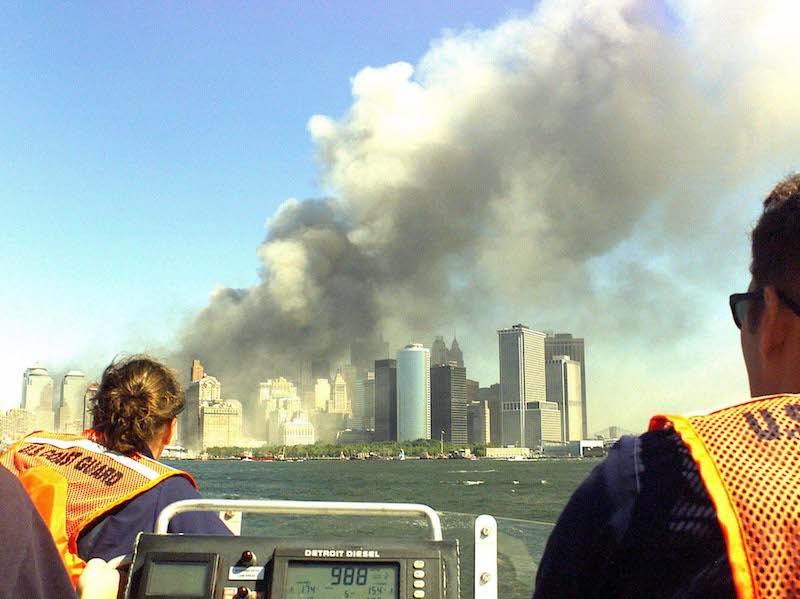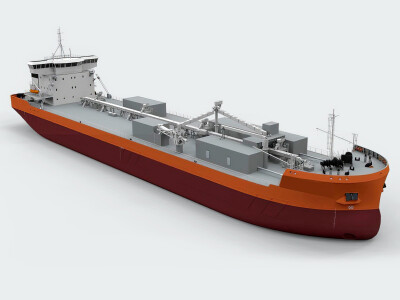More than 3,000 people perished when planes flew into the Twin Towers of the World Trade Center during the 9/11 terrorist attacks in 2001. Lesser known are scores of other victims who 17 years later continue to die or suffer from debilitating illnesses from the toxic dust they inhaled when the towers collapsed.
One such death — Thomas Phelan of New York who passed away on March 16 — is a reminder of the heroic deeds performed by mariners who went into harm’s way and steered their vessels to Lower Manhattan. They helped evacuate between 500,000 and a million people by water on that horrific September day.
Phelan was working as captain of a Statue of Liberty ferry when the Twin Towers were struck. He turned his tour boat into a rescue vessel that morning, playing a key role in what became the largest maritime evacuation in history, an operation that was bigger than the historic nine-day evacuation of Dunkirk during World War II.
Phelan died of cancer at age 45. His illness is believed to have been directly linked to the toxic fumes at Ground Zero that he inhaled during the rescue. Phelan went on to become a NYC firefighter after the attacks, assigned to a marine unit on Staten Island. He was diagnosed with lung cancer in February and died less than two months later.
The Uniformed Firefighters Association of Greater New York says that more than 170 firefighters have died over the past 17 years as the result of illnesses related to the attacks. Dust that spread across Lower Manhattan after the towers fell released a mix of dangerous chemicals that were inhaled by first responders, office workers, school children, teachers and local residents.
The dust contained heavy metals like lead and mercury from thousands of computers and lights, ground glass, noxious chemicals, asbestos, benzene, jet fuel and other carcinogens. This cocktail caused cancer in some, and lung, intestinal and muscular ailments in many others. Autopsies performed on some of the deceased confirmed presence of these dangerous agents.
Phelan was part of the massive maritime boat lift in which captains and crews of some 125 ferries, tugs, Coast Guard vessels and pleasure boats responded to an emergency call by the Coast Guard and rushed to the site. Over the next eight hours, they evacuated terrified people, many of whom were injured, and delivered supplies, water and emergency workers to Lower Manhattan.
The most menacing challenge for mariners was the dust, which created whiteout conditions and left captains navigating only by radar, according to Jessica DuLong, a journalist, historian and author of Dust to Deliverance: Untold Stories form the Maritime Evacuation on September 11.
A retired chief engineer of a FDNY fireboat, DuLong writes that the dust exposure “began a years long process of illness that would for some mariners contribute to an early death. It’s impossible to know how many mariners would end up suffering from illness.”
She said that at least 120 ferry captains, deckhands and mates are registered with the federal World Trade Center Health Program, which has 60,000 people registered as potentially vulnerable. Of the mariners, 53% suffer from at least one illness or condition that doctors attribute to 9/11 exposure, according to DuLong.
"Based on accumulated knowledge and medical science, occupational medicine physicians have now learned that, for many responders, WTC-related physical and mental conditions are likely to be permanent,” according to the WTC program. “Sadder still, new patients are still being seen who haven't been evaluated before or treated.”
Congress created the WTC Health Program to provide health monitoring for those exposed to dangerous dust and established the Zadrogan Victim Compensation Fund, named after a NYC firefighter who recently died from lung complications believed to be linked to 9/11. The fund offers financial support to whose who are sick, and to the families of those who have died.
While Phelan’s maritime service is a reminder of the heroics of that day, his death is also reminder of how the wounds of 9/11 are a long way from healing as so many victims still experience unimaginable suffering to this day.





